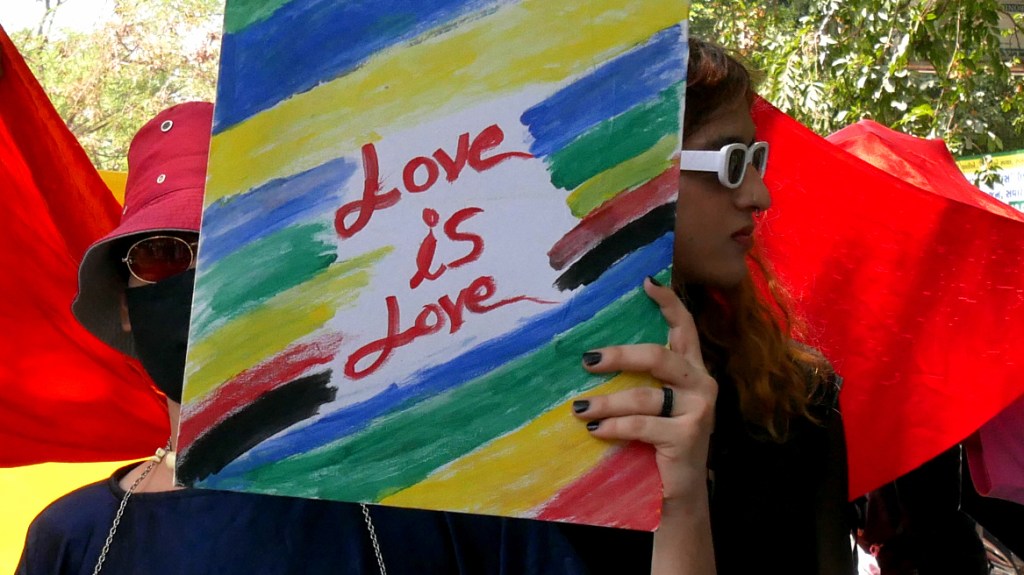The Supreme Court’s verdict to not accord legal recognition to same-sex marriage under the Special Marriage Act (SMA) has left the LGBTQIA+ community, counsels and activists across the spectrum split.
While some said that “there was no hope” in the proposed panel by the Centre, others were of the opinion that many observations made by the judges were “in their favour”.
The Supreme Court, on Tuesday, stressed that queer persons had the right to choose their partners and asked the Centre to ensure that couples were not discriminated against. The Constitution bench, however, differed on adoption by same-sex couples and ruled 3:2 against it in four separate judgments.
Also Read: Supreme Court refuses to recognise same-sex marriage in 3-2 verdict
What did the court say?
The apex court refused to strike down the provisions of the Special Marriage Act (SMA) or insert words into it. The petitions had sought to include same-sex marriages in the Act which is meant for inter-caste and inter-faith marriages.
During the hearing back in May, the petitioners sought marriage rights equal to heterosexual couples. The Centre had told the court that any constitutional declaration made by the court on this issue may not be a “correct course of action” as the court will not be able to foresee, envisage, comprehend and deal with its fallout.
In his judgment, the Chief Justice of India (CJI) said the court can only interpret the law and not frame it. He said if the court reads down or inserts words into Section 4 of the Special Marriage Act to give marriage rights to LGBTQ community members, then it would be entering into the legislative domain. The SC also said the right to marry is “not a fundamental right”, and hence cannot be claimed as a matter of right by the LGBTQ community.
The five-judge bench said that whether there is a need for change in the regime of the Special Marriage Act is for Parliament to decide.
Though the top court refused to legalise same-sex marriage, it offered a plethora of other rights to the LGBTQ community. The CJI said that without the right to marry which can be given by legislature, the LGBTQ community members have the right to choose a partner and the right to intimate association and the state must recognise a bouquet of their rights to ensure such couples enjoy rights of association unhindered.
The Chief Justice also backed same-sex couples’ right to adopt children, however, it was a stand turned down by the majority verdict of the judges on the bench.
What do petitioners and activists say?
The petitioners had presented a series of strong and compelling arguments. These arguments centered on issues relating to marriage equality, human rights, personal freedom, social validity, and legal recognition.
Ultimately, the court — both the majority as well as the minority — failed to provide the only relief that the petitioners had asked for: a simple declaration that the institution of marriage should be open to two consenting adults, irrespective of their sex, gender identity, or sexual orientation.
What they got instead was an acknowledgment that family laws disproportionately exclude the queer community — a well-recognised predicament and, in fact, the very reason that had compelled the petitioners to move the court.
Also Read: ‘Meaning of liberty…:’ What CJI Chandrachud said in opinion on same-sex marriage – Top Quotes
Responding to the judgment, Geeta Luthra, senior advocate and counsel for several petitioners in the case, told news agency ANI, “Even if the right to marriage has not been given, CJI has said that the same bundle of rights which every married couple has should be available to same-sex couples.”
LGBTQIA+ rights activist Harish Iyer, one of the petitioners, also noted the observations in favour of the queer community. “Though in the end, the verdict was not in our favour but, so many observations made were in our favour. They have also put the responsibility on the central government. The Solicitor General said so many things against us, so it is important for us to go to our elected government, MPs and MLAs and tell them we are as different as two people. War is underway… it might take some time but we will get societal equality,” ANI quoted him as saying.
Sandhya Honawar, an LGBTQ and adoption rights activist and a Nguvu Change leader, said that there was “no hope from the proposed panel”.
“It is such a heartbreaking result. The court, if not authorise queer community to get married under the Special Marriages Act, could have done something to interpret it in a manner that could’ve opened some doors for the community. However, I am happy that CJI Chandrachud said that this is not an urban or an elitist concept,” Honawar told Financial Express.
She added, “The court left it to the Parliament to decide and said that a committee will look into it, but I have no hope that the panel will even bother to look into the issues of the queer community. The hopes of thousands of people have been dashed.”
The verdict came as a surprising blow to the LGBTQ+ community, especially in light of the Supreme Court’s recent progressive stance on LGBTQ+ rights and its willingness to step into a legislative role to ensure and protect fundamental rights.
The setback, however, makes it imperative for the legislature, responsible for translating public will into legal framework. More so, since the judgment specifically made note of the Centre’s assurance that it will form a committee headed by a Cabinet Secretary which will examine whether certain legal rights can be granted to same-sex couples without legalising their union.

